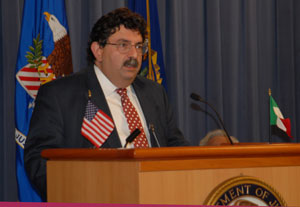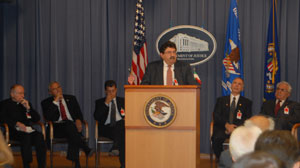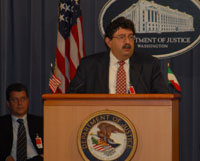
| INDEX TO ARTICLES |
| CONTACT US |
![]()
|
Remarks by Hon. Francis Allegra*
48th Annual Ceremony Commemorating Charles J. Bonaparte 46th Attorney General and Founder of the FBI |
|
United States Department of Justice, June 20, 2008 As a lawyer here at the Department of Justice, then as a judge, I have been privileged to attend, over the years, many of these Bonaparte ceremonies. While some have been more greatly attended than others, all have been instructive, inspiring and compelling. For many years, those ceremonies were marked by the presence of two individuals, both of whom, unfortunately, are no longer with us. One was N. John Lacorte, who founded the Italian Historical Society of America in 1949 and who played a critical role not only in the establishment of this ceremony, but in the naming of the Verrazano Bridge and the institution of Columbus Day as a n Judge Re was, of course, intimately familiar with all of Attorney General Bonaparte’s many contributions to society. He, of course, knew that Bonaparte was a member of the Indian tribal commission, the Secretary of the Navy, the 46th Attorney General of the United States, and the founder of an investigative unit that would become the Federal Bureau of Investigation. But, in his overarching way, I think Judge Re viewed Charles Joseph Bonaparte as a constant reminder of the importance of public service and having good public servants. Indeed, Judge Re’s writings suggest that, as a student of history, he viewed Bonaparte as among a line of leaders who, over the centuries, have been dedicated to the concept that the practice of all professions, including the law, should advance the greater good. That line, according to Judge Re, included not only Attorney General Bonaparte, but other luminaries such as the Lord Chancellor and saint, Thomas More, as well as Dean Roscoe Pound. In accepting the St. Thomas More Award from St. John’s University Law School in 2003, Judge Re asked, “If Thomas More were here today, what advice might he give to restore the respect and esteem that are properly deserved for lawyers and the legal profession?” Answering this question, Judge Re observed that Thomas More might note that “American lawyers, trained in the adversary system primarily as advocates, In another speech, Judge Re reminded us that Dean Roscoe Pound – who famously once spoke of the reasons for popular dissatisfaction with the law – had defined a profession as a “group pursuing a learned art as a common calling in the spirit of public service.” Judge Re noted in that same speech that “[t]he practice of law ‘in the spirit of public service’ can and ought to be the hallmark of the legal profession.” In this and other writings, Judge Re repeatedly emphasized the importance of adhering to the fundamental precepts of honesty and integrity, which he viewed as critical in improving the moral dimensions of not only the law, but all professions. As Judge Re once used the words of Thomas More and Dean Roscoe Pound to make his points, so, today, I humbly use Judge Re’s comments about those individuals to provide us with a bit more perspective on the many accomplishments of Attorney General Bonaparte. Viewed through that prism, Bonaparte symbolizes what it means to be a professional, particularly in the law, but especially in the context of public service. I would ask that we use this ceremony today to remind us that we are all called to our professions, whatever they may be, in the service of the common good. If we respond to that call, we will not only be honoring the memory of our friends, Judge Re and Mr. Lacorte, but will be living in the tradition of greatness and public service exhibited by one Charles Joseph Bonaparte. And that will make today’s ceremony truly relevant. Thank you for coming today. *Hon. Francis M. Allegra is a Judge on the U.S. Court of Federal Claims Click here for more information on the Charles Bonaparte Annual Ceremony
|
 ational holiday. The other was Judge Edward Re, former Chief Judge of the Court of International Trade and, for many years, a professor of law at St. John’s University Law School. He, of course, played a critical role in convincing Attorney General Robert F. Kennedy – after whom this building is now named – to attend the first of these ceremonies. I thought that I might take a moment today, during my brief remarks, to comment on Bonaparte – not solely from my perspective, but from the perspective of Judge Re, as revealed in his many eloquent writings.
ational holiday. The other was Judge Edward Re, former Chief Judge of the Court of International Trade and, for many years, a professor of law at St. John’s University Law School. He, of course, played a critical role in convincing Attorney General Robert F. Kennedy – after whom this building is now named – to attend the first of these ceremonies. I thought that I might take a moment today, during my brief remarks, to comment on Bonaparte – not solely from my perspective, but from the perspective of Judge Re, as revealed in his many eloquent writings.  too often tend to view a dispute as a contest to obtain maximum advantage for one’s client to the detriment of the other party rather than seek a compromise that is mutually agreeable, and morally acceptable.” He added that he was confident that Thomas More “would urge that our training for the legal profession should concentrate more on the role of the lawyers as counselor and not devote almost all of our time and efforts to advocacy” and that Thomas More would “stress the crucial role that legal counsel can perform in avoiding controversy, encouraging settlement, and resolving disputes without resort to litigation.”
too often tend to view a dispute as a contest to obtain maximum advantage for one’s client to the detriment of the other party rather than seek a compromise that is mutually agreeable, and morally acceptable.” He added that he was confident that Thomas More “would urge that our training for the legal profession should concentrate more on the role of the lawyers as counselor and not devote almost all of our time and efforts to advocacy” and that Thomas More would “stress the crucial role that legal counsel can perform in avoiding controversy, encouraging settlement, and resolving disputes without resort to litigation.”